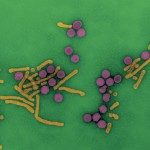Link to Pubmed [PMID] – 12095925
Ann. N. Y. Acad. Sci. 2002 Jun;963:21-36
Hepatocellular carcinoma (HCC) is a major type of primary liver cancer and one of the rare human neoplasms etiologically linked to viral factors. Chronic infections with the hepatitis B virus (HBV) and the hepatitis C virus (HCV) have been implicated in about 80% of cases worldwide, and other known environmental risk factors, including alcohol abuse and dietary intake of aflatoxin B1, might synergize with viral infections. Recent insight into the molecular mechanisms leading to HCC development has been provided by the identification of major genetic abnormalities revealed by genomewide allelotype studies and molecular cytogenetic analysis. Moreover, several oncogenic pathways have been implicated in malignant transformation of liver cells. Inactivation of the p53 tumor suppressor gene by mutations and allelic deletions in about 30% of HCC cases has been associated predominantly with exposure to aflatoxin B1 and HBV infection. By contrast, a mutation in the beta-catenin gene in around 22% of HCCs is more rare in HBV-associated tumors. Activation of cyclin D1 and disruption of the Rb pathway are also commonly involved in liver tumorigenesis. New major challenges include the identification of candidate genes located in frequently altered chromosomal regions and that of oncogenic pathways driven by different risk factors. This search might shed some light on the tumorigenic role of HBV and HCV. It might also permit accurate evaluation of major targets for prognostic and therapeutic intervention.

